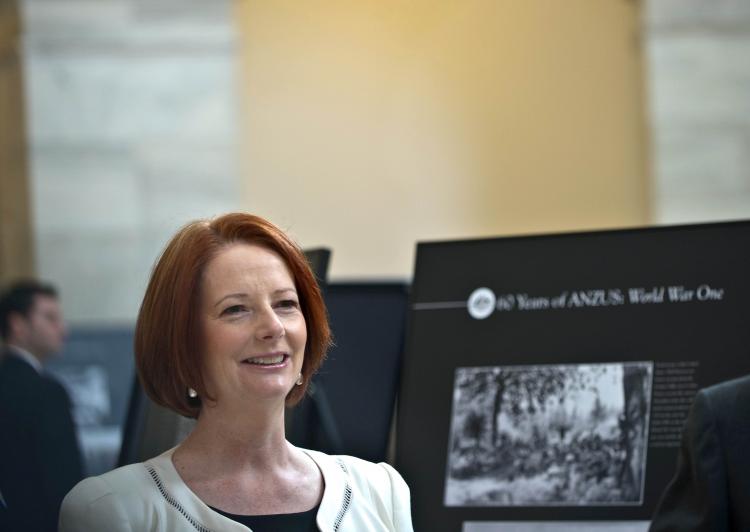“I suspect it will be polite, efficient, professional, but with little flourish or fanfare,” said Dr John Lee, a specialist in international relations with the Australian Centre for Independent Studies.
It is Ms Gillard’s first visit to China as prime minister and the first for an Australian leader since former PM Kevin Rudd visited with plenty of media hype over his Mandarin speaking skills.
Dr Lee, who is also a visiting fellow with the Hudson Institute in Washington, says the sort of attention Kevin Rudd drew was not to Australia’s advantage, noting that expectations of closer relations were raised on the China side, resulting in an inevitable shortfall.
“We then saw the lowest points in the Australia-China relationship a couple of years later, for a generation,” he said.
While Julia Gillard has little affinity with China, there are indications that Australia’s largest trading partner has not been far from the prime minister’s mind.
Australia US Alliance
Her visit to China follows a successful visit to the US, where she spelt out clearly where Australia’s allegiances lie.
“The United States and China are both important to our future,” she told US reporters. “Our alliance with America is rock solid, but we want to see China take its proper place in the rules-based order in our world.”
Concerns were also raised, by Republican Senator John McCain, about China’s military build-up, which has seen a double-digit rise in military spending in the last year and agitation by Chinese forces in the South China Sea.
The prime minister was diplomatic in responding, but acknowledged the concerns, saying: “I think Australia and the US need to co-operate on all strategic challenges and what is happening in our region is largely being defined by the rise of China.”
Dr Lee said concerns about China’s military build-up were legitimate.
“Until China can credibly account for the increases, we have no option but to view China’s military expansions as potentially destabilising,” he said.
However, he did not believe that the prime minister’s statements would impair her standing in China.
The Chinese leadership’s primary focus is economic, he said, and, as a result, Chinese leaders see relationships with Western leaders as processes of “competitive negotiating”.
“What we see as friendliness can often be interpreted as acquiescence or weakness by Beijing,” he explained.
Continued on the next page...
Trade and Values
Ms Gillard has signalled the terms of her visit by reportedly taking a large business contingent with her and, to date, no other ministers.
Dr Lee believes the prime minister’s focus on economics with China, while getting closer to the US strategically, is moving in the right direction.
“This may not be very imaginative, but it is probably the sensible path to take,” he said.
Trade, however, should not preclude raising human rights concerns, he said, discounting fears that it could harm Australia economically.
“We should state that we expect China to simply uphold the human rights standards that Beijing itself tells the world it is committed to,” he said.
Australia has felt the weight of China’s authoritarian regime over the last few years with concerns raised across a range of issues, including large Chinese state investment in Australia, the lack of transparency over the arrest and subsequent imprisonment of Australian Rio Tinto executive Stern Hu, reports of Chinese cyber espionage on Australian Government computers and just last week, the strange disappearance and then reappearance of Dr Yang Hengjun, a Chinese Australian dissident blogger who was visiting China.
New Australian Ambassador
While it is unlikely that Ms Gillard will be making any public statements about China’s human rights record during her visit, further evidence that she intends to set her own boundaries with China may be assumed in the choice of Frances Adamson as Ambassador to China.
Ms Adamson is the first woman to be appointed to the role, and the first diplomat in 30 years to be appointed to Beijing after serving an ambassador-level role in Taiwan. She has a degree in economics and was notably chief of staff to former Foreign Minister and now Defence Minister Stephen Smith.
Ross Maddock, Chairman of the Australian Taiwan Business Council, says the Gillard Government has made a good choice.
“You know, China is a country of such great sway in the world now it’s easy for people to get a bit captured and become a spokesperson for the host government,” he said on the ABC. “So one needs always to remember the home government’s interests and I think that’s what Frances has always done and done superbly.”
While trade with China is important, Mr Maddock believes Ms Adamson will focus as much, if not more, on Australia’s “strategic interests and our political interests”.
And that, he said, would require being honest with China and upfront about Australian values.
“I think that it’s a good thing for Western countries to stand up for our values, stand up for democracy, stand up for our position on strategic and human rights issues,” he said. “If she [Ms Adamson] believes those things, and I’m sure she does, then she will do it with the highest level of diplomatic skill.”






